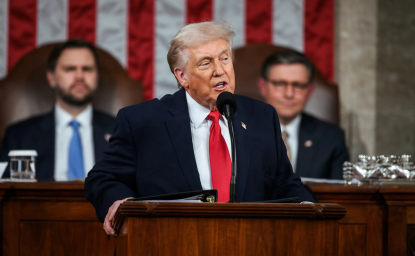A Heartbeat from the Presidency
Wilson Center Public Policy Scholar Al Eisele, who served as press secretary to Vice President Walter Mondale, offers insights into the evolution of the vice president's office.
Wilson Center Public Policy Scholar Al Eisele, who served as press secretary to Vice President Walter Mondale, offers insights into the evolution of the vice president's office.
From John Adams to Dick Cheney, the 46 men who have served as vice president of the United States from 1789 to the present have, understandably, been a varied lot. But all had two things in common.
First, each stood, literally, a heartbeat from the presidency. Indeed, 14 of the 46 vice presidents went on to become president, including five in the 20th century, as the result of assassinations, natural deaths, or resignations: Theodore Roosevelt, Calvin Coolidge, Harry Truman, Lyndon Johnson, and Gerald Ford.
Second, vice presidents were unable to make the job personally satisfying or politically important. Therein lies the paradox of the vice presidency. While it carries a stigma as one of the most awkward and unworkable offices in the federal government whose occupants have been saddled with meaningless duties, it has been proven by history to be the surest path to the White House.
But the notion of the vice president as the fifth wheel of government changed with the election of Jimmy Carter and Walter Mondale in 1976. As Mondale and others made clear at an April 26 Wilson Center Directors Forum, he and Carter created a model that changed the nature of the office.
Mondale, the first vice president to have an office in the White House, traveled extensively throughout the nation and the world promoting the Carter administration's domestic and foreign policies while establishing the concept of an activist vice president. As one who was privileged to work for him as press secretary during his four years as vice president, I can attest to this description.
Shortly after the 1976 Democratic National Convention nominated Mondale as Carter's running mate, an aide advised him, "the most important determinant of the success of your vice presidency will be your relationship with the president."
Mondale took that advice to heart. As he later wrote, "We understood each other's needs. We kept each other's confidence. Our relationship in the White House held up under the searing pressure of that place because we entered our offices understanding— perhaps for the first time in the history of those offices—that each of us could do a better job if we maintained the trust of the other. And, for four years, that trust endured."


